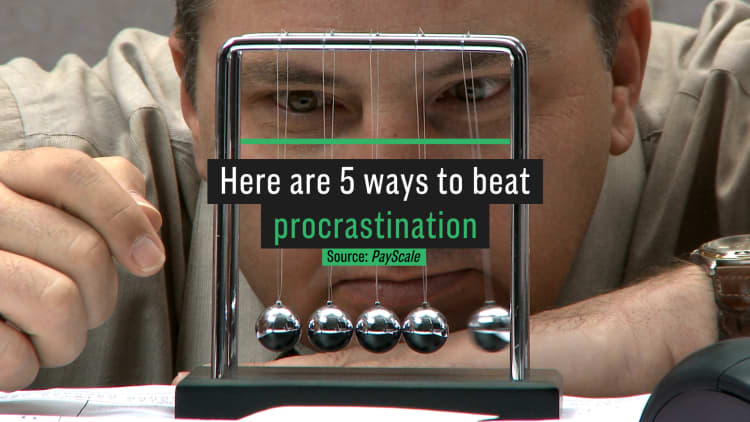Information is the fundamental building block of everything we do. Whether it's executing a project at work, learning a new skill or starting a side hustle, all these things require finding and putting to use the right data.
But we often find ourselves mentally juggling and straining to recall things. I study neuroscience and mental performance, and I've found that the most successful people are always sharpening their memory power — so that their ideas become more concrete and new connections are easily revealed.
I call it the "CODE" method: Capture, organize, distill, express.
1. Capture: Only keep what resonates
Much of what we come across is useful and interesting, like how-to articles that could make us more productive, podcasts with people sharing hard-won lessons, or inspiring photos of travel destinations we want to visit one day.
But we can't store every bit of this information stream. Here are four criteria to help you decide exactly what nuggets of knowledge are worth keeping:
- Does it inspire you? Inspiration is one of the most precious experiences in life. It is the essential fuel for doing your best work.
- Is it useful? Statistics, research findings or helpful diagrams aren't all necessarily inspiring, but they are things that might come in handy in the future.
- Is it personal? I often save screenshots of text messages sent between my family and friends. The small moments of warmth and humor that take place in these threads are precious to me.
- Is it surprising? If you're not surprised by the information, then you already know about it on some level. Surprise is an excellent barometer for information that doesn't fit neatly into your existing understanding, which means it has the potential to change how you think.
2. Organize: Save for accountability
We can't store every bit of information in our brains. Sometimes it's best to do it digitally, but I'm not talking about creating a perfect hierarchy of 100 folders for 100 topics.
There's a better way to organize your ideas, and it involves taking the small extra step of putting a note into a folder (I'll use the term "folder" to refer to the main unit of organization used by most note apps).
With this system, every piece of information you want to save can be placed into one of four categories:
- Projects: Short-term efforts that you're working on right now, such as completing a web-page design, finishing a language course or researching the best podcast microphone.
- Areas: Long-term responsibilities you want to manage over time. For example, the area of our lives called "finances" that doesn't have a definite end date; it's something we will have to think about and manage for as long as we live.
- Resources: Think about what you are interested in (e.g., architecture, interior design), subjects you are researching (e.g., habit formation, project management), and useful information you want to be able to reference (e.g., vacation spots, project testimonials).
- Archives: Inactive items from the other three categories. For example: projects that are completed or canceled, hobbies you're no longer interested in, or responsibilities you're no longer committed to.
The archives are important because they allow you to place a folder in "cold storage." You can access that information in the future — maybe you take on a project similar to one you previously completely — within seconds.
3. Distill: Find the essence
Once you start capturing ideas in a central place and organizing them for action, you'll begin to notice patterns and connections between them.
An article you read about gardening, for example, will give you insight into growing your customer base. An offhand testimonial from a client will give you the idea to create a webpage with all your client testimonials.
There is a powerful way to facilitate and speed up this process of rapid association: Distill your notes down to their essence.
Every idea has an "essence," or the heart and soul of what it is trying to communicate. It might take hundreds of pages and thousands of words to fully explain a complex insight, but there is always a way to convey the core message in just a sentence or two.
Every time you take note of something, ask yourself: "How can I make this as useful as possible for my future self?" That question will lead you to annotate the words and phrases that explain why you saved a note, what you were thinking, and what exactly caught your attention.
4. Express: Show your work
All the previous steps — capturing, organizing and distilling — are geared toward one ultimate purpose: sharing your own ideas, your own story, and your own knowledge with others.
It doesn't matter how grand your output is, or who you tell it to. What matters is that you are finding your voice and insisting that what you have to say is important.
It's only when you begin expressing your ideas and turning your knowledge into action that your brain really begins to change:
- You'll read differently, becoming more focused on the most relevant parts.
- You'll ask sharper questions, no longer satisfied with the vague explanations.
- You'll naturally seek venues to show your knowledge, since the feedback you receive will propel your thinking forward.
Best of all, you'll act more deliberately, thinking several steps beyond what you're consuming to consider its potential to make you better.
Tiago Forte is a neuroscience and productivity expert who teaches organizations and individuals how to be more organized, effective and creative. He is the author of "Building a Second Brain: A Proven Method to Organize Your Digital Life and Unlock Your Creative Potential." Follow him on Twitter @fortelabs.
Don't miss:



